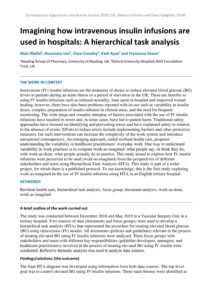| Document | Author Mais Iflaifel, Rosemary Lim, Clare Crowley, Kath Ryan and Francesca Greco |
| Abstract Intravenous (IV) insulin infusions are the treatment of choice to reduce elevated blood glucose (BG) levels in patients during an acute illness or a period of starvation in the UK. There are benefits to using IV insulin infusions such as reduced mortality, time spent in hospital and improved wound healing; however, there have also been problems reported with its use such as variability in insulin doses, complex preparation of insulin infusion in clinical areas, and the need for frequent monitoring. The wide range and complex interplay of factors associated with the use of IV insulin infusions have resulted in errors and, in some cases, have led to patient harm. Traditional safety approaches have focused on identifying and preventing errors and have explained safety in relation to the absence of errors. Efforts to reduce errors include implementing barriers and other protective measures, but such interventions can increase the complexity of the work system and introduce unexpected consequences. An emerging approach, called resilient health care, proposes understanding the variability in healthcare practitioners’ everyday work. One way to understand variability in work practices is to compare work-as-imagined: what people say, or think they do, with work-as-done: what people actually do in practice. This study aimed to explore how IV insulin infusions were perceived to be used (work-as-imagined) from the perspectives of different stakeholders and users using Hierarchical Task Analysis (HTA). This study is part of a wider project, for which there is a published protocol. To our knowledge, this is the first study exploring work-as-imagined in the use of IV insulin infusions using HTA in an English tertiary hospital. |

